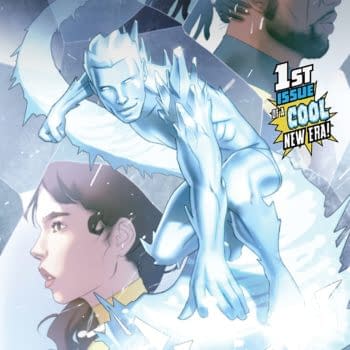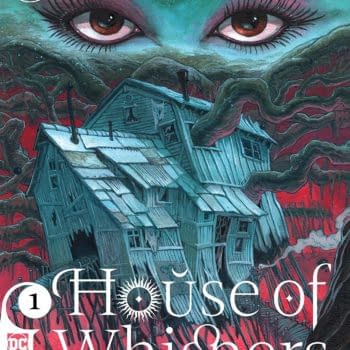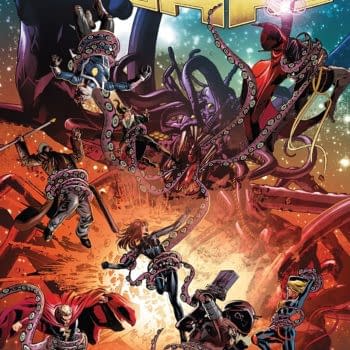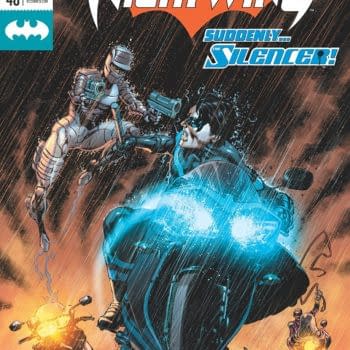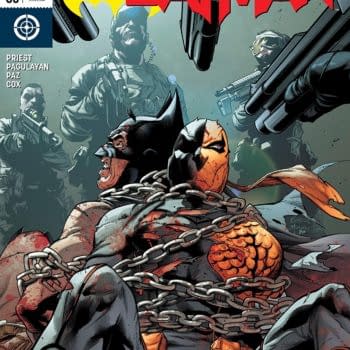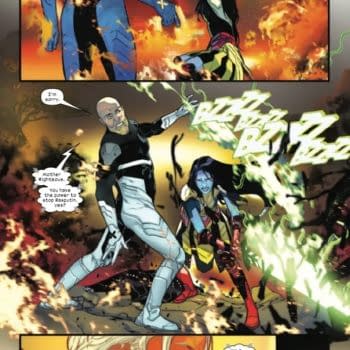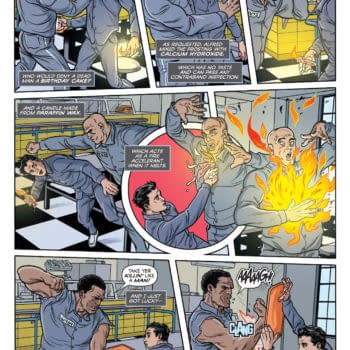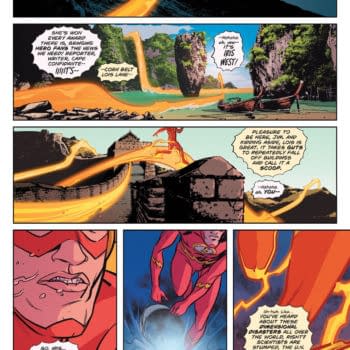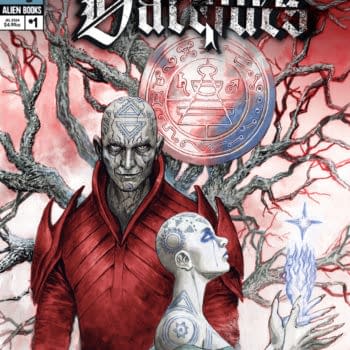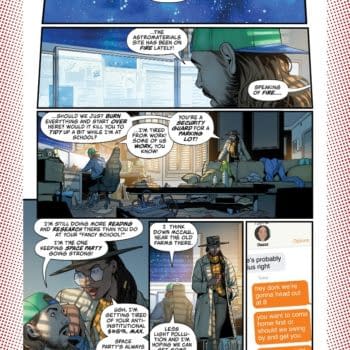Posted in: Comics, DC Comics | Tagged: Batman, catwoman, commissioner gordon, dc comics, deadshot, deathstroke, HRL, independence day, joker, Jonathan Kent, justice league, lois lane, Mikel Janin, patrick gleason, Peter J Tomasi, rebirth, riddler, Scott Godlewski, superboy, superman, Tom King, war of jokes and riddles
Love And War In Comics: Looking Back At Superman #28 And Batman #28
With some encouragement from Rich Johnston and Mark Seifert, I've decided to take a look back at comics I've reviewed from time to time to analyze some interesting themes that they may share or conflict upon.
This past week's Superman #28 and Batman #28 both look at war in a way. They approach it in similar fashions, but display it in different manners. They both look at wars past, but Superman doesn't put the war front and center in the story in the same way that Batman does. For all intents and purposes, the war is still very much happening for the reader in Batman #28, as it is the first time we've been made privy to the particularities of "the War of Jokes and Riddles."
I do encourage you to read some of the other work on Bleeding Cool that also takes a look at these comics. Rich has a pretty funny analysis of one of the main plot points of Superman #28.
Fellow reviewer Joe Glass also reviewed Batman #28.
And, of course, I'm going to shamelessly plug my review of Superman #28 and my review of Batman #28.
For starters, I think Superman #28 is a far better read than Batman #28. The latter of these two made some rookie mistakes in storytelling, making all of the events Bruce is telling Selina Kyle about far more passive and summarized than they should be. It's telling instead of showing, and I don't care if it's "supposed" to be a summary of events — it still doesn't make for good storytelling (this frustration is directed at a commenter on my Batman review, not at Batman writer Tom King).

Both comics kind of glorify war in certain ways. Bear with me here; if you've read them, that's going to sound like a questionable analysis at first.
Superman does it by going through the honorifics of the men and women who participate in war. They are raised higher through their participation in these harsh and nightmarish conflicts. I'm not saying that it's a bad thing; service men and women deserve every bit of respect and honor they get, and more so.
However, you do wander into a weird philosophical area. Through this, you're encouraging people to enter into these conflicts they may not be suited to handle. Yet, they enter it anyway based on the idea that they want that respect and honor and know this is the only place they can earn it. Welcome to the American patriotism economy of respect: you can be universally accepted as a worthwhile human being, but you have to be shot at first.
Batman depicts war far more harshly, even if it is ironically more off-panel than Superman's more bright and optimistic approach. Go figure.
It talks about the death and horror that has resulted from the conflict between the Joker and the Riddler. However, there is still a bit of necessity given to the conflict. It must happen. Batman is the coolest, most awesome badass ever (the comic's words, not mine), so he has to go handle it. This is the way the world works, so Batman is an honorable human being for following through.
When I say this conflict "had" to happen, I am getting a bit more meta with the interpretation. I'm mostly referring to how painfully contrived the "War of Jokes and Riddles" plot has turned out. I'm also referring to the fact that at no point, in all the death and mutilation, do Gordon, Batman, or Catwoman ask the question of how any of this can be avoided. They don't need to ask. In their mind and the mind of the story, this had to happen.
This also casts a bit of a disparaging light on the rest of the Batman canon. Joker and Nigma have literally waged war over the city, causing countless deaths, and no one has done a permanent thing to stop Joker or the Riddler since then. I know it's superhero comics and the nature of the genre, but the creative team chose to tell this story. They had these two unhinged individuals do something this horrible. It's going to have implications relevant to all the events that chronologically happen afterwards.
Going back to the honorifics we pay towards service men and women, these comics also have wildly different philosophies in regards to that.
Superman #28 uses almost all of its runtime to give due respect to veterans. Superman even finds the long-lost body of a Civil War vet and gives it back to the descendants of the soldier.
Batman #28 almost makes a token reference to the National Guard in its attempts to stop the literal war that is burning Gotham City to the ground. However, this minor acknowledgement that people outside of Batman exist that are meant to handle this kind of thing only serves to make them look horribly ineffectual.
Firstly, this organization has done nothing to stop the terror, and this event would make waves beyond Gotham. Just because Gordon — who doesn't look good in all this, either — doesn't cede control of the situation to federal authority, does not mean it wouldn't happen regardless. Secondly, Gordon and the police are the closest thing to a military authority in this madness, and he hasn't managed to stop it — which, with the exception of Grundy, Croc, Ivy, Deathstroke, Man-Bat, Clayface and Freeze (sorta), really is mostly consisting of crazy people who aren't superhuman in any way. Furthermore, Gordon even surrendered himself to these people at the beginning of the comic. At what point do you stop trusting the Bat and actually make a concerted effort to stop a Mad Max plot from playing out in your city? I mean, given some recent events, I don't have the greatest faith in our police force in certain areas, but I think they would act on something like this.
It kind of smacks of the old Adam West Batman television series where the police were only there to ask Batman for help.
In this way, Superman manages to have faith in the trained people in uniform to take care of problems. Batman doesn't even trust them to show up to the party.
Admittedly, both views have their strong and weak points. I'm a pacifist, so yeah, it seems like a good idea to avoid military action and not tell citizens that entering the armed forces is the only true way to be a worthwhile human being. However, it does take a different and rare kind of person to be willing to be shot at to protect other people. Moralism can be a complicated thing.
My general distrust of authority and the above joke about police officers doing awful things sometimes does lend to seeing Batman #28's point of view on the thing. However, it's also some libertarian anarchist nonsense, and that philosophy has zero understanding of how the world actually works. I may distrust authority, but I do understand that it needs to be there for society to actually, you know, exist.
To bring this to something of a close, Superman #28 is more simplistic in its worldview, but it doesn't place its god-like character as the end-all, be-all problem solver. It respects the military for being there when Superman can't be, both in-universe and in the real world. Meanwhile, Batman #28 disregards that these people exist in a token attempt to explain why Batman has to handle this one. Batman can do anything and can solve anything, and that's why you don't need the National Guard to stop a domestic war from happening in Gotham City.






